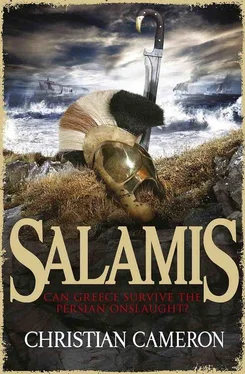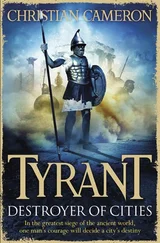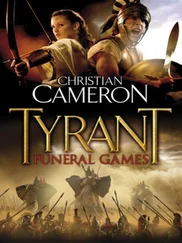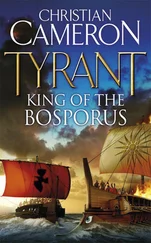Christian Cameron - Salamis
Здесь есть возможность читать онлайн «Christian Cameron - Salamis» весь текст электронной книги совершенно бесплатно (целиком полную версию без сокращений). В некоторых случаях можно слушать аудио, скачать через торрент в формате fb2 и присутствует краткое содержание. Год выпуска: 2015, Издательство: ORION, Жанр: Исторические приключения, на английском языке. Описание произведения, (предисловие) а так же отзывы посетителей доступны на портале библиотеки ЛибКат.
- Название:Salamis
- Автор:
- Издательство:ORION
- Жанр:
- Год:2015
- ISBN:нет данных
- Рейтинг книги:4 / 5. Голосов: 1
-
Избранное:Добавить в избранное
- Отзывы:
-
Ваша оценка:
- 80
- 1
- 2
- 3
- 4
- 5
Salamis: краткое содержание, описание и аннотация
Предлагаем к чтению аннотацию, описание, краткое содержание или предисловие (зависит от того, что написал сам автор книги «Salamis»). Если вы не нашли необходимую информацию о книге — напишите в комментариях, мы постараемся отыскать её.
Salamis — читать онлайн бесплатно полную книгу (весь текст) целиком
Ниже представлен текст книги, разбитый по страницам. Система сохранения места последней прочитанной страницы, позволяет с удобством читать онлайн бесплатно книгу «Salamis», без необходимости каждый раз заново искать на чём Вы остановились. Поставьте закладку, и сможете в любой момент перейти на страницу, на которой закончили чтение.
Интервал:
Закладка:
At any rate, my daughter was safe enough. Or so I had to hope, because unless I wanted mutiny and blood, my oarsmen wanted to go home. At Artemisium we were an easy day’s rowing from the narrows where Euboea nearly connects to the mainland, just another day’s walk or two from Plataea over to the west near Mount Cithaeron. As we had nearly the whole phalanx of Green Plataea and nearly every man of substance either rowing or serving as marines — and as the Persians would be at our gates in three days or less — Plataea represented the more immediate crisis.
We rowed with a will. But as we rowed, I marshalled my arguments for the rowers. When we camped on the beaches of Boeotia that night, I convinced Myron and both Peneleos and Empedocles, sons of Empedocles, and old Draco himself and Myron’s rich friend Timaeus — and Hermogenes and Styges and Idomeneus and the rest — to give me one more day of rowing. I suggested that some men be sent ahead, walking, or riding. I sent Ka and his archers and they found mules and a pair of horses to carry our messengers. I didn’t ask Ka too many questions about where the horses had come from.
‘Let’s take the ships around to Athens,’ I said to the men on the beach. ‘They need them for their evacuation. And we can go as swiftly over the mountains from Eleusis as across Boeotia from here.’
Myron nodded. ‘There might already be Persian troops loose in Boeotia,’ he said. ‘Their cavalry-’
Hermogenes nodded. ‘And the Thebans have already Medised,’ he said, as everyone spat. ‘They’re between us and home, here.’
Styges glared. ‘Traitors,’ he said.
We chose a dozen steady men — well, Idomeneus was one, and no one ever called him steady, but they needed a killer to get them through if the going got rough. Ka stole more horses — let’s call it what it was — and the messengers rode off with careful instructions and Timaeus to see they were obeyed.
The rest of us woke before dawn and rowed. We were in advance of most of the rest of the fleet, because we were rowing to save our goods and families. We passed the headland at Brauron south of Marathon under sail and I could see the temple and the old bridge and I was delighted to see that there was no one moving — no girls dancing in the courtyard, no children playing at goats on the old hill above the cave of the goddess. We had a beautiful wind and we ran towards Sounion on an empty coast, but towards afternoon, as we prepared to weather Poseidon’s promontory, we saw the flash of oars behind us. We knew Cimon’s squadron had stayed to watch the Persians and we guessed the Athenian’s public ships were moving in a body under Xanthippus, rowing as hard for home as they could.
I feel I should explain that, in the years before Artemisium, the Athenians had invested the whole output of their silver mines in building a fleet of more than a hundred well-built triremes. Five of them were being crewed by Plataeans, and had Plataean officers and marines. It seemed to me awkward — at best — to leave these five ships on the beaches of Boeotia while we ran home to save our furniture and I said so.
We were not, as it proved, the first ships of the Allied Fleet to reach the beaches at Phaleron. But we rowed past, despite the late hour, and swept into the narrow channel between the Island of Salamis and the mainland as the sun dropped into the sea beyond Megara to the west.
The Bay of Salamis was covered in ships. Fishing boats, merchant ships of every size, rowing boats, military pentekonters and even older triakonters of thirty-oared ships were going back and forth, turning the sea to froth by the beating of their oars, or so the poets liked to say.
I landed my ships on one of the north-facing beaches on the island of Salamis, and after borrowing a horse and making some hasty arrangements, we gathered the men together — all the Plataeans in one great council. It was, to all intents and purposes, a meeting of the City of Plataea.
Why Salamis? Because that’s where most of the Athenians were. Like I said, I didn’t want to leave their precious ships to rot on the beach or be captured. I handed the five public ships over to a member of the Athenian boule and he was already finding rowers for them while Myron negotiated our passage across to Attica — easy enough, as the Athenians’ shipping was mostly empty going that way. We arranged for all our men to go to Eleusis.
Then I spent time putting my professional crews back together. I had men who were Plataean citizens, but my oarsmen, in several ships; we’d sent them out through the fleet to train other rowers. My Lydia had kept her crack crew, and now I left her under Seckla with a skeleton crew and no marines, but with Ka and all his archers and Leukas as his helmsman. Paramanos was dead but we’d retaken Black Raven and I gave her to Giannis with Megakles as his helmsman. In fact, Black Raven was not my property and eventually a probate court in Athens or Salamis would see to it that someone bought her and Paramanos’s daughters were paid, but that was all in some hazy future where the rule of law applied. In the immediate future, Athens needed every ship. Paramanos had a mostly Athenian crew, including Thracians, Cilicians, and men of Cyrenaica, his port of origin so to speak, but they had taken terrible casualties fighting three Egyptians at Artemisium and we had to refill the benches. Aristides was going to Corinth with his wife, but his helmsman Demetrios had his own long Athena Nike well in hand, and he’d made captures at Artemisium and seemed content. Amastis, our rebuilt Corinthian trireme that has been the source of so much trouble, had come through both battles untouched and her crew was professional and under Moire, who needed no help from me. But Moire, like many of his men, had taken up their Plataean citizenship and had homes or families in Plataea. For some oarsmen it was an empty honour and their families were already on Salamis, but others, and especially my old crews in Lydia and Storm Cutter , crewed by Chian exiles and other men who’d settled at Plataea, had deeper roots — and they were needed. Many of them wanted to go back to Plataea, even for a few hours, to see to their families.
Moire had adjusted to ‘being Greek’ better than many of my other foreign (or barbarian) friends. His name was an allegory for his acceptance. In his own tongue, Moire (or something that sounded that way) meant ‘a jet black horse’ or so he told us, but in Greek, Moira is the Goddess of Fate and Fortune and many newly enfranchised ex-slaves chose to call themselves ‘Moiregeneus’ or ‘Born of Good Fortune’. Moire never changed his name. And that, I think, represents the man. He sacrificed to our gods, especially to Poseidon, Lord of Horses. But he always had his own gods, small images he carried with him at sea. It was his particular skill, or tact, that he seemed to like being Greek, but never ‘needed’ us particularly. In Athens or in Syracusa you could find him squatted down on his heels with a dozen other men of his kind, jabbering in their barbarous tongue and then he’d stand up, pull his himation around himself, and walk off for wine with another kubernetes or helmsman.
As usual, I digress. Harpagos offered to stay with the ships and he was the best kubernetes or trierarch of the lot. I left him in command with good officers and loafing warriors like Sittonax the Gaul and orders to keep the men who stayed busy every day, either training to fight or training to row. He had about three full crews when the rest of us headed for Plataea and I had almost four hundred men.
Brasidas shook his head. ‘I’ll stay and train the marines,’ he said. He meant the ten best oarsmen he’d chosen to replace all the men who’d died on Black Raven. I pitied them. But I also knew I’d sleep better knowing that he and Seckla would run a tight camp with sentries and watchtowers — and that Brasidas, although it hurts me to say it, could command a respect from the Athenian oligarchs that Seckla would not. I was to regret not taking him, but that’s the way decisions go.
Читать дальшеИнтервал:
Закладка:
Похожие книги на «Salamis»
Представляем Вашему вниманию похожие книги на «Salamis» списком для выбора. Мы отобрали схожую по названию и смыслу литературу в надежде предоставить читателям больше вариантов отыскать новые, интересные, ещё непрочитанные произведения.
Обсуждение, отзывы о книге «Salamis» и просто собственные мнения читателей. Оставьте ваши комментарии, напишите, что Вы думаете о произведении, его смысле или главных героях. Укажите что конкретно понравилось, а что нет, и почему Вы так считаете.












